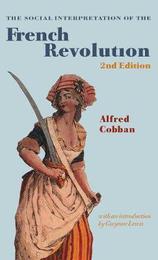
|
The Social Interpretation of the French Revolution
Hardback
Main Details
| Title |
The Social Interpretation of the French Revolution
|
| Authors and Contributors |
By (author) Alfred Cobban
|
|
Introduction by Gwynne Lewis
|
| Series | The Wiles Lectures |
|---|
| Physical Properties |
| Format:Hardback | | Pages:230 | | Dimensions(mm): Height 216,Width 140 |
|
| Category/Genre | World history - c 1750 to c 1900 |
|---|
| ISBN/Barcode |
9780521661515
|
| Classifications | Dewey:944.04 |
|---|
| Audience | | Tertiary Education (US: College) | | Professional & Vocational | |
|---|
| Edition |
2nd Revised edition
|
|
Publishing Details |
| Publisher |
Cambridge University Press
|
| Imprint |
Cambridge University Press
|
| Publication Date |
27 May 1999 |
| Publication Country |
United Kingdom
|
Description
Alfred Cobban's The Social Interpretation of the French Revolution is one of the acknowledged classics of post-war historiography. This 'revisionist' analysis of the French Revolution caused a furore on first publication in 1964, challenging as it did established orthodoxies during the crucial period of the Cold War. Cobban saw the French Revolution as central to the 'grand narrative of modern history', but provided a salutary corrective to many celebrated social explanations, determinist and otherwise, of its origins and development. A generation later this concise but powerful intervention is now reissued with a new introduction by Gwynne Lewis, providing students with both a context for Cobban's own arguments, and assessing the course of Revolutionary studies in the wake of The Social Interpretation. This book remains a handbook of revisionism for Anglo-Saxon scholars, and is essential reading for all students of French history at undergraduate level and above.
Reviews'This is a provocative, lively, and well-written book, and its call for a truly modern sociology of the Revolution can only meet with general approval.' Review of Politics 'This book will be both stimulating and challenging to all those who have so far accepted the orthodox 'bourgeois versus aristocrat' theory.' The Times Educational Supplement
|